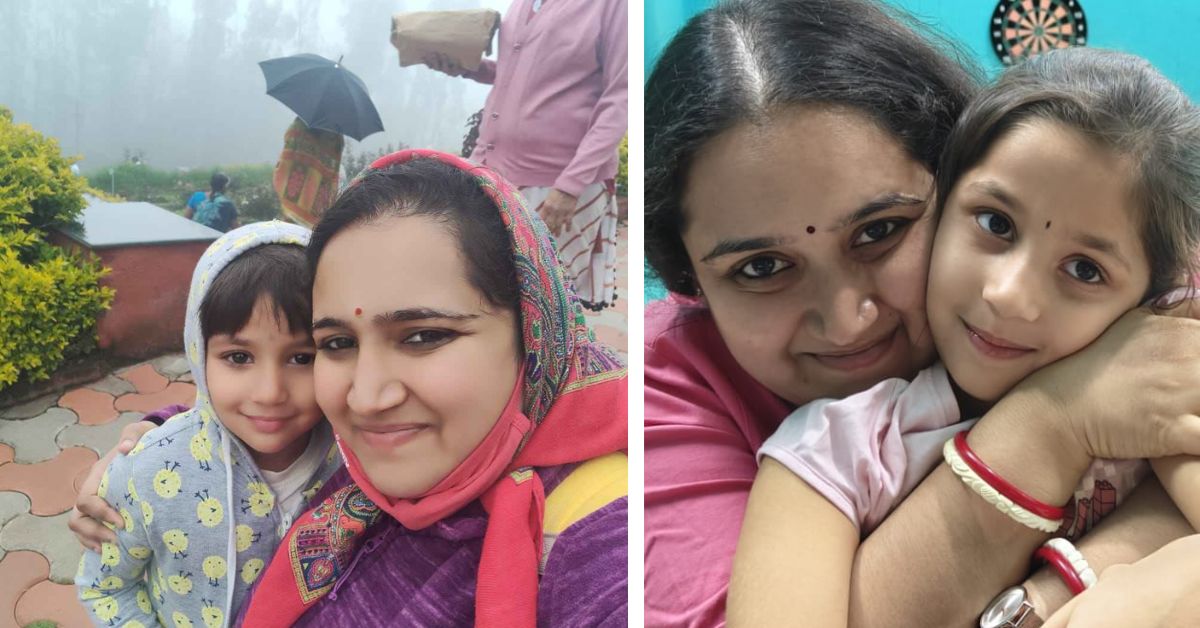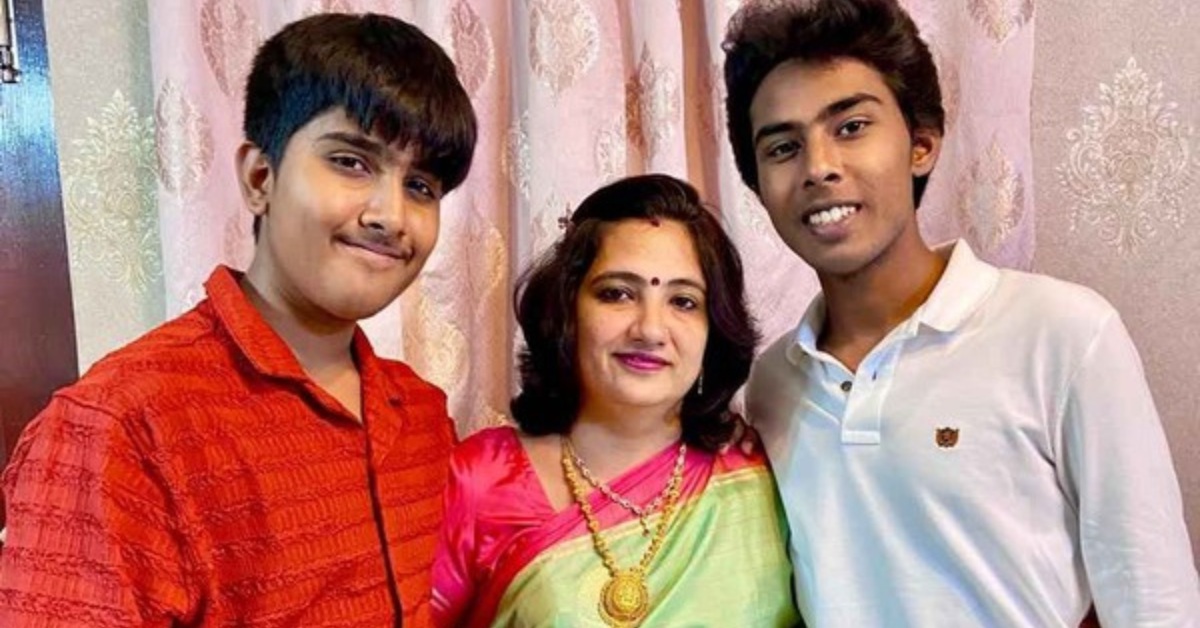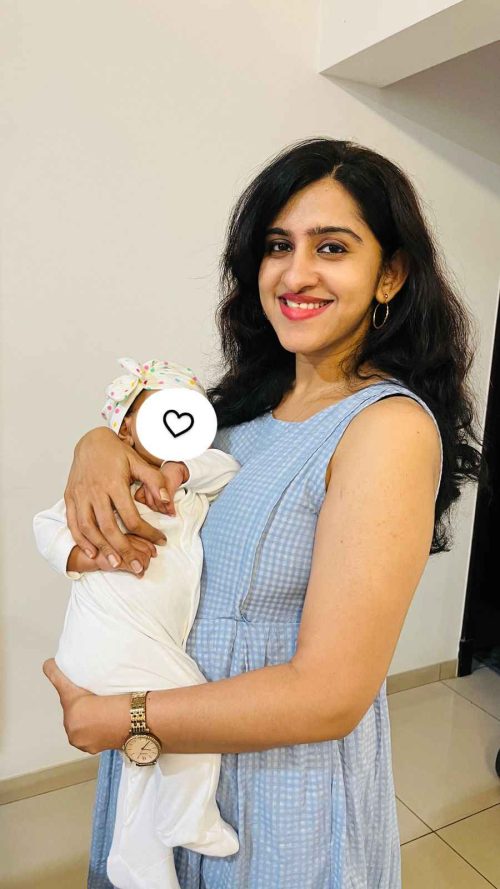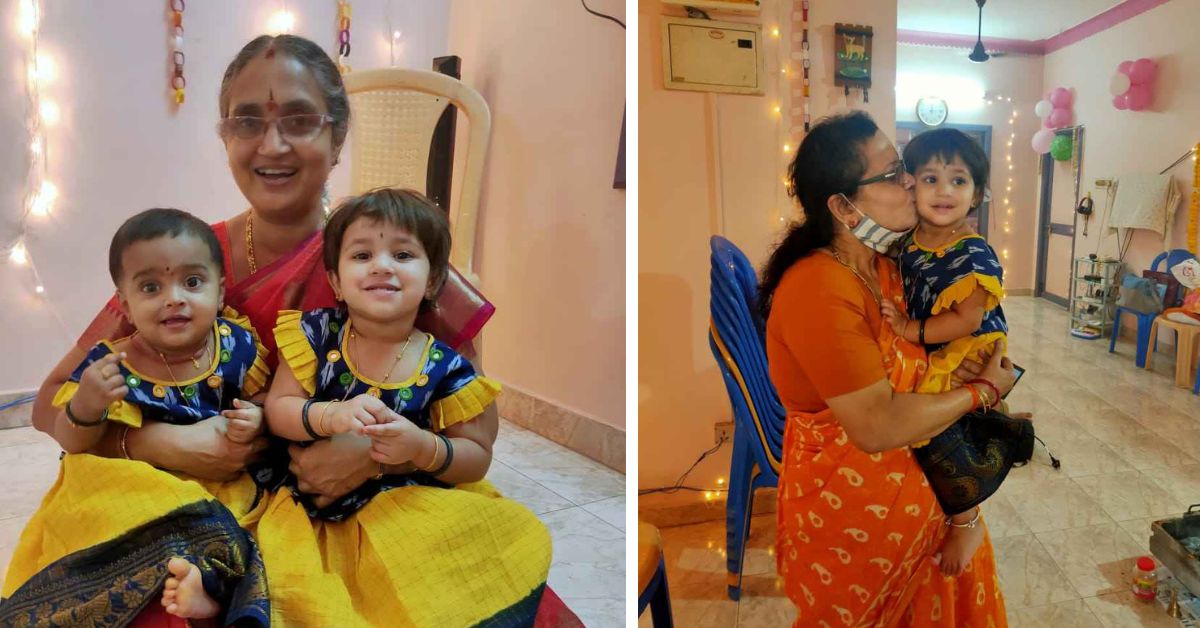What Hasn’t Changed About Motherhood: Sleepless Nights, Selfless Love & Voices From Across Generations
Wake up before the baby does.
Check if the house help is coming.
Feed the baby. Change the diaper.
Wait — did she just sneeze?
Groceries need ordering, vegetables need chopping, meals need cooking… and the day has only just begun.
For 33-year-old Mangala Venkatesh, a millennial mother, this was her reality not too long ago. Her daughter is six now, but the memories of those chaotic mornings are still vivid.
A teacher by profession, Mangala says her mind is constantly occupied even when she has no work to get done physically. “The only moment I relax is when I hit the bed to sleep at night. More than physical exhaustion, I think being a mother is more exhausting mentally,” shares Mangala, who had given up her career for six years after having her baby. “However, I have no regrets for doing so, because I enjoy motherhood as much as I enjoy teaching,” she smiles.
 Mangala has restarted her professional life after a seven year long gap and couldn’t be happier to have taken that step.
Mangala has restarted her professional life after a seven year long gap and couldn’t be happier to have taken that step.
She has restarted her professional life after a long gap and couldn’t be happier to have taken that step. “All thanks to my ever-supportive husband and understanding six-year-old daughter, I was able to resume what I love – Teaching!” she smiles.
This Mother’s Day, The Better India spoke to mothers across generations to explore what motherhood looks like — and feels like — through their eyes. How have things changed? What’s remained the same? And what does being a mother really mean today?
The Balancing act: How this millennial mom juggles office meetings & diaper duties
For 30-year-old Saumya Chawla Nagpal, life is a constant dance between toddler tantrums and work calls — all while trying to remember if she ordered enough milk for the day. A Delhi-based entrepreneur and mother to a spirited 2-year-old, Kimaya, Saumya says it’s her “village” — her husband, in-laws, and parents — that makes it all possible.
“Honestly, I have relied so heavily on my husband, in-laws and parents,” she shares with gratitude.
Even now, Saumya looks back at the to-do lists saved on her phone from when Kimaya was born — digital reminders of how she survived the chaos of early motherhood. “My notes were filled with all the checklists for the day. Today I go back to them and read and realise how beautifully I have managed the days I was a ‘new mom,’” she smiles.
 “I always want to ensure my baby experiences all kinds of things — different cuisines, or going out to social spaces,” Saumya says.
“I always want to ensure my baby experiences all kinds of things — different cuisines, or going out to social spaces,” Saumya says.
Each list was a lifeline — “what groceries I am supposed to buy for that day, how much milk I must pump for my baby, how much I had pumped during the day, when is the next feed and so much more,” she recalls.
“Mom’s brain works like this: We think of doing one task and the next minute we forget it. That’s how it has always been for me,” she laughs.
While her calendar is packed, her heart is full. Whether it’s planning new meals or bedtime cuddles, Saumya is determined to make every day meaningful for her daughter. “Currently I always want to ensure my baby experiences all kinds of things — it can be different cuisines, or going out to social spaces. I just don’t want her to be stuck in between four walls,” she says.
Her mind, she confesses, is a whirlwind of tasks and emotions. “Everything from keeping track of her health to making sure her day is smooth, to organising new activities or a new kind of food she can taste today and even doing some online shopping to get her cute outfits… all of these are there in my head. This apart, my work is also something that needs a lot of focus and relationships. Ensuring good relationships with husband, in-laws, and parents is also as important as everything else,” she explains.
There’s no perfect balance, just daily recalibration. And through it all, Saumya holds on to what truly matters.
“Motherhood and career aren’t competing priorities — they are both a part of who I am. Between diaper changes and meetings, it’s an endless guilt management and balancing act. While they say it takes a village to raise a child, it also takes a village to support a working mother.”
Two boys & a calm mindset: How this Gen X mom found joy in the simplicity of motherhood
At a time when today’s mothers often find themselves pulled in a dozen directions — managing careers, childcare, home, and relationships — Ramya Senthilkumar’s experience stands in gentle contrast. A 45-year-old mother of two boys, Ramya describes her parenting journey from 19 years ago as less of a juggling act, and more of a peaceful rhythm — one she embraced wholeheartedly.
“I completely relied on my mother-in-law for my pregnancy care, delivery and baby care as she is from the medical field. And I think that was the best decision,” she shares, acknowledging the quiet strength of intergenerational support that many mothers today miss out on.
While some mothers describe motherhood as mentally and emotionally overwhelming, Ramya saw it differently — with clarity and calm.
“My husband entirely took care of the finances, while I focused on myself, the baby and our home. We had a great partnership and I felt it was my duty to take care of my baby.”
For Ramya, the key lay in simple structure and a predictable routine. “There was a list of things I had to do on a daily basis after I had my baby. They were regular feed, bathe, clean, take care of myself and the home. After my first son was born, I was all by myself in Hyderabad and after my second son we moved to Bangalore. I always chose to do all things on my own at my own pace and comfort,” she says.
 In a world that glorifies hustle, Ramya’s story is a quiet reminder that motherhood can be slow, steady, and fulfilling — with support, wisdom, and two easygoing boys.
In a world that glorifies hustle, Ramya’s story is a quiet reminder that motherhood can be slow, steady, and fulfilling — with support, wisdom, and two easygoing boys.
That sense of ease wasn’t accidental — it was built slowly, with intention, and a flexible, grounded approach. “While it came to getting out of home for doctor visits for the baby, my husband always accompanied me and was around for any help. We made sure we were flexible for changes and I think most new parents will discover this as they travel together,” Ramya reflects.
In a world that often glorifies hustle and overachievement, Ramya’s story is a gentle reminder that motherhood, at its heart, can also be slow, steady, and deeply fulfilling — especially when shared with a supportive partner, a wise elder, and two boys who took life as it came.
“The secret is to go with the flow & not think much”: What a new mom learned in just 3 months
For Priyanka Thirumurthy, motherhood hit like a wave — fast, all-consuming, and completely life-altering. Just three months into her journey, she candidly admits, she’s running on auto-pilot.
A journalist by profession and fiercely independent by nature, Priyanka never expected motherhood to be such a humbling experience. Her entry into it was anything but smooth. A C-section, followed by frequent hospital visits because her newborn was diagnosed with jaundice — that’s how her first two weeks postpartum unfolded.
“For someone who was always self-sustaining in all ways, birthing my baby taught me that it’s good to take help. First 17 days after delivery I had to monitor, control, and observe everything to do with the baby. But I soon realised I needed a lot of help and that I should trust people around me with my baby,” she shares.
 For Priyanka, the early days of motherhood felt less like an emotional whirlwind and more like checking things off a to-do list.
For Priyanka, the early days of motherhood felt less like an emotional whirlwind and more like checking things off a to-do list.
It was a turning point — that moment of surrender — that helped lighten her mental load. She began to focus on what truly needed her attention: her baby. And perhaps, slowly, herself.
“I was so sleep deprived that all I just told myself was that I need to just keep the baby alive and healthy, everything else is secondary. As I found ways to ensure I got some good sleep, I gradually began to focus on the baby and only do that, while my husband took care of my recovery.”
Her honesty is striking — something every new mom can likely relate to. The late-night Google searches, the endless advice, the contradictory dos and don’ts — all of it adds to the noise. And Priyanka’s been there too.
“When in doubt, the first thing new mothers do, including me, is to browse. That itself gives a lot of stress. The research we do gives us a lot of information, which is, mostly contradicting what the doctor says. When we stop doing this, I think a lot of our mental load is off our heads, and new mothers can think clearly.”
For Priyanka, the early days of motherhood felt less like an emotional whirlwind and more like checking things off a to-do list. It became a job — one she threw herself into, completely.
“While taking care of my baby, I didn’t bring in emotions, and I had a to-do list in my mind and struck off things as I finished them. I never thought about myself. It was always the baby. I think mothers just power through everything, small or big challenges, after they give birth to their baby. The secret is to just go with the flow and not think much,” she says with raw honesty.
To make daily life a little more manageable, they decided to bring in help.
“So as to ease the daily duties as a mother, we hired a help, to bathe and massage the baby, wash her clothes and more. For other tasks of playing with her or reading her a book we have my parents and in-laws around,” she shares.
As for routines, Priyanka has let go of the idea of a strict schedule — something she once held close.
“I just know what I have to finish during the day. There is no timing set for any of the tasks. I was someone who had a schedule for everything but now I have come to terms with not having a schedule and that it is all about the baby’s demands.”
In just three months, this new mother has learned one of the most important lessons of all — that motherhood rarely goes by the book. And sometimes, the best way to show up is simply to flow with the chaos.
Early to rise, last to sleep: how mothers made it work 40 years ago
No smartphones to set reminders.
No appliances to make cooking easier.
No washing machines to lighten the load.
That’s what daily life looked like for Sai Chitra Venkatesh and Bhavani Krishnamurthy when they became new mothers in the 1980s.
Married into the same home, Bhavani (65) and Chitra (55) say living in a joint family made everything manageable — even joyful. It gave them the support, reassurance, and shared strength that every new mother needs.
The co-sisters settled in for a nostalgic chat with us, taking a warm, honest walk down memory lane — back to the days when motherhood looked very different, yet felt just as consuming.
“My daughter was born in 1985, and I was 26. While my husband had just launched his business, I relied heavily on my mother-in-law, brother-in-law, and Chitra with the baby’s work. And today I can tell it was the three of them who raised my daughter while I took care of the home, made meals for all, and did all the household chores,” shares Bhavani.
 From brewing coffee to feeding the dog, Bhavani and Chitra stayed on their feet, while others looked after the little ones.
From brewing coffee to feeding the dog, Bhavani and Chitra stayed on their feet, while others looked after the little ones.
It was never just one person doing it all—someone was always around to lend a hand. While Bhavani focused on her baby and managed the kitchen, Chitra took care of everything else—often without stopping to take a breath.
From brewing coffee for the whole family to making sure meals were on time, to even feeding the dog, Chitra was constantly on the move. And while she did that, Bhavani, their brother-in-law, and their mother-in-law cared for the little ones.
“Being in a joint family can be a big blessing, provided one overlooks all the differences in opinion. Any task or challenge was made simpler and dealt with easily because there were so many to help around, especially when it came to any issues with the baby,” Chitra explains.
Back in the 80s, the roles in most households were sharply divided — men earned the money, and women took care of everything else.
“While they brought in the money, we provided all the care the kids and others needed. So our goals and aims were very clear and as a team we worked towards that,” the ladies share.
They admit they didn’t know words like postpartum depression or baby blues. They didn’t have terms for the hormonal upheavals or mental load, but that didn’t mean the emotions weren’t real.
“Hence, we didn’t pay attention to any of those. We only lived every day for the love we had for our children, and that gave us so much clarity on the tasks we had to carry out for them,” shares Chitra.
Each day was full to the brim — waking up before everyone else, sleeping after the whole household had turned in. There were no shortcuts, just relentless energy and deep love.
“This is how a day looked for us 30 years ago, and today, when we look back, we only wonder how we found the mental strength and physical energy to be able to do so much,” smiles Bhavani.
One of the biggest challenges for Chitra was the emotional dependence her daughter had on her.
“From Maa, I need soap for a shower, to Maa, where is my blanket in bed?” I was her only go-to person. Anything missing in the house had to be me, she banked on. And this was a little challenging considering the amount of work I already had. However, gradually, as the children age, they would get their things together and fly away from the little nest we made for them,” she recalls.
Edited by Leila Badyari
News